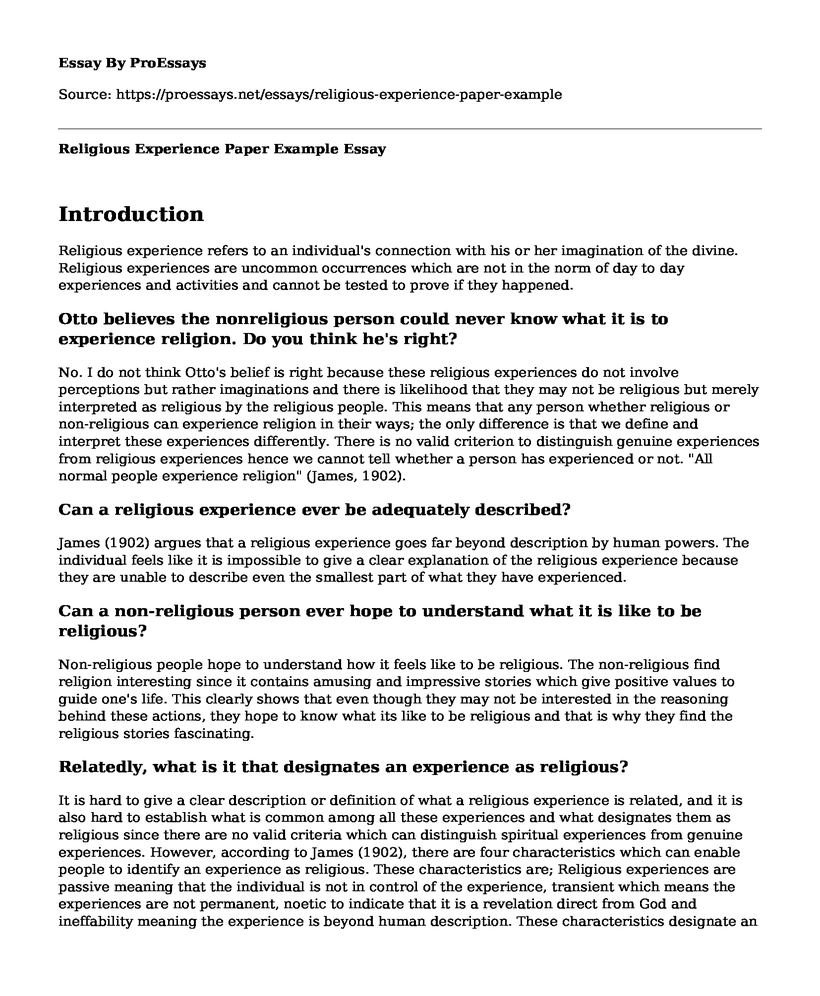Introduction
Religious experience refers to an individual's connection with his or her imagination of the divine. Religious experiences are uncommon occurrences which are not in the norm of day to day experiences and activities and cannot be tested to prove if they happened.
Otto believes the nonreligious person could never know what it is to experience religion. Do you think he's right?
No. I do not think Otto's belief is right because these religious experiences do not involve perceptions but rather imaginations and there is likelihood that they may not be religious but merely interpreted as religious by the religious people. This means that any person whether religious or non-religious can experience religion in their ways; the only difference is that we define and interpret these experiences differently. There is no valid criterion to distinguish genuine experiences from religious experiences hence we cannot tell whether a person has experienced or not. "All normal people experience religion" (James, 1902).
Can a religious experience ever be adequately described?
James (1902) argues that a religious experience goes far beyond description by human powers. The individual feels like it is impossible to give a clear explanation of the religious experience because they are unable to describe even the smallest part of what they have experienced.
Can a non-religious person ever hope to understand what it is like to be religious?
Non-religious people hope to understand how it feels like to be religious. The non-religious find religion interesting since it contains amusing and impressive stories which give positive values to guide one's life. This clearly shows that even though they may not be interested in the reasoning behind these actions, they hope to know what its like to be religious and that is why they find the religious stories fascinating.
Relatedly, what is it that designates an experience as religious?
It is hard to give a clear description or definition of what a religious experience is related, and it is also hard to establish what is common among all these experiences and what designates them as religious since there are no valid criteria which can distinguish spiritual experiences from genuine experiences. However, according to James (1902), there are four characteristics which can enable people to identify an experience as religious. These characteristics are; Religious experiences are passive meaning that the individual is not in control of the experience, transient which means the experiences are not permanent, noetic to indicate that it is a revelation direct from God and ineffability meaning the experience is beyond human description. These characteristics designate an experience as religious.
References
James, W. (1902). The varieties of religious experience. New York, NY: Penguin Books. Retrieved on 11th February 2019 from https://www.taylorfrancis.com/books/9781134470723
Cite this page
Religious Experience Paper Example. (2022, Nov 20). Retrieved from https://proessays.net/essays/religious-experience-paper-example
If you are the original author of this essay and no longer wish to have it published on the ProEssays website, please click below to request its removal:
- Classroom Management Need Analysis Essay
- Critical Essay on Limited Frame of Reference
- Case Study of Death and Dying
- Essay Example on UC: A Premier Center of Learning & Research Since 1868
- Paper Example on Ethnographic Research: Studying Childhood Development in Schools
- Essay Example on What Is Intelligence? Exploring Different Theories
- Paper Sample on UDL-Transform Math Course Syllabus for Student-Centered Learning







